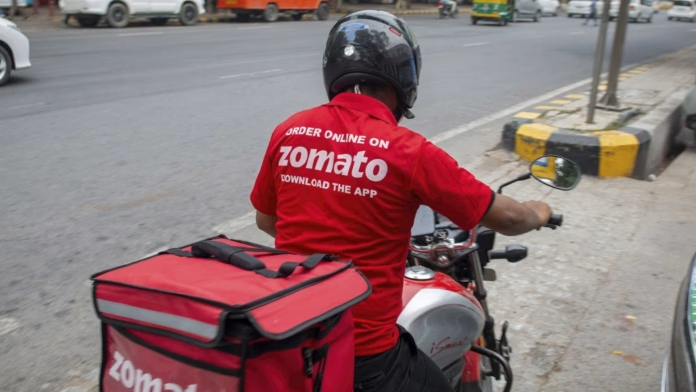The food delivery sector is expected to experience unchanged average order values (AOV) over the next year, as projected by Zomato’s CFO, Akshant Goyal, even with steady food inflation.
Zomato’s average order value (AOV) has seen a slight increase over the past year, growing by 2 percent from INR 398 in FY22 to INR 407 in FY23. This growth occurred despite fluctuations in the food inflation index, which ranged between 4.2 percent and 8.2 percent during that period.
“Inflation has been pretty range bound for the last few months, but I think AOV is still strong and if at all, trending upwards. So at this point, it feels like if you look forward to next year, you don’t expect the AOVs to fall. Maybe they will remain flat,” Goyal said in a post-earnings call with analysts.
In the March quarter, Zomato experienced a decline of around 1 percent in the gross order value of its food delivery business, amounting to INR 6,569 crore. This decrease can be attributed to both the industry-wide slowdown and Zomato’s withdrawal from 225 cities in the preceding quarter.
According to Zomato’s earnings report for the March quarter, the average monthly transacting users (MTUs) decreased sequentially from 17.4 million to 16.6 million.
Zomato’s management attributed the decline in average monthly transacting users (MTUs) to the reintroduction of its loyalty program, known as Zomato Gold, during the quarter.
“Because of Zomato Gold, actually the MTU number has come down and not gone up. We are seeing an impact of clubbing some orders in the same households which might have just a single membership. Zomato Gold, in fact, we think has led to a reduction in MTUs and not an increase. While the order frequency goes up, the number of people ordering typically goes down,” Goyal explained on the call.
In response to a question regarding Zomato’s average commission from restaurants, the company expressed its expectation of an increasing take-rate in the future. Zomato believes that as eateries recognize more value from their partnership with the food delivery platform, the average commission is likely to rise.
“We want the commission rates to be competitive and we still think we are lower than what the competition is charging. So, I think as we continue to add more value to restaurant businesses, we expect some improvement in commission revenue going forward,” said Goyal.
According to Zomato’s regulatory filing, the company’s revenue from operations amounted to INR 2,056 crore, reflecting a significant increase of 69.66 percent compared to INR 1,211.8 crore in the corresponding quarter of the previous year.
During the March quarter, Zomato reported that its business, excluding quick commerce, achieved positive adjusted EBITDA. The food delivery segment played a significant role, contributing INR 78 crore in EBITDA. Zomato also outlined its objective of attaining positive adjusted EBITDA and PAT on a consolidated basis, including quick commerce, within the next four quarters.
Zomato’s Co-founder, Deepinder Goyal, stated that the company plans to achieve its goal by boosting profits in the food delivery business and minimizing losses in the quick commerce (Blinkit) business.





